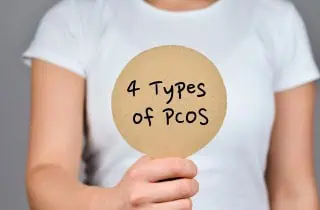
Polycystic ovary syndrome (PCOS) is not one disease. Instead, it’s “a heterogeneous disorder with different underlying biological mechanisms.” In other words, it’s a set of symptoms (androgen excess and anovulatory cycles) caused or driven by several underlying factors. To successfully treat PCOS, you need to identify which factor (or factors) is driving the symptoms. In other words, you need to know your functional type of PCOS.
The four functional types of PCOS include insulin-resistant PCOS, post-pill PCOS (which is temporary), inflammatory PCOS, and the far less common adrenal PCOS.


